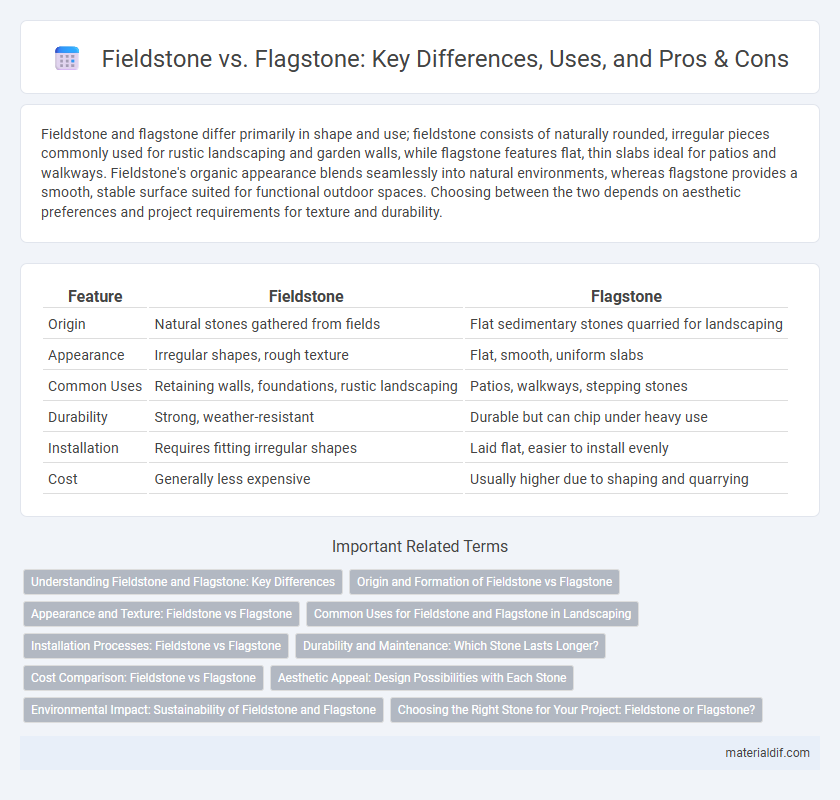Fieldstone and flagstone differ primarily in shape and use; fieldstone consists of naturally rounded, irregular pieces commonly used for rustic landscaping and garden walls, while flagstone features flat, thin slabs ideal for patios and walkways. Fieldstone's organic appearance blends seamlessly into natural environments, whereas flagstone provides a smooth, stable surface suited for functional outdoor spaces. Choosing between the two depends on aesthetic preferences and project requirements for texture and durability.
Table of Comparison
| Feature | Fieldstone | Flagstone |
|---|---|---|
| Origin | Natural stones gathered from fields | Flat sedimentary stones quarried for landscaping |
| Appearance | Irregular shapes, rough texture | Flat, smooth, uniform slabs |
| Common Uses | Retaining walls, foundations, rustic landscaping | Patios, walkways, stepping stones |
| Durability | Strong, weather-resistant | Durable but can chip under heavy use |
| Installation | Requires fitting irregular shapes | Laid flat, easier to install evenly |
| Cost | Generally less expensive | Usually higher due to shaping and quarrying |
Understanding Fieldstone and Flagstone: Key Differences
Fieldstone consists of naturally rounded, irregular stones typically gathered from surface fields, prized for rustic landscaping and sturdy retaining walls. Flagstone features flat, thin slabs of sedimentary rock such as sandstone or limestone, frequently used for paving patios, walkways, and flooring due to their smooth, uniform surfaces. The main distinction lies in shape and texture: fieldstone offers organic, uneven forms while flagstone provides flat, consistent pieces ideal for creating level surfaces.
Origin and Formation of Fieldstone vs Flagstone
Fieldstone is a naturally occurring stone collected from the surface of fields, formed over time through the weathering and erosion of bedrock in glacial and sedimentary environments. Flagstone originates from sedimentary rock layers, typically sandstone, that have undergone pressure and compaction, resulting in thin, flat slabs ideal for paving. The geological processes behind fieldstone ensure a variety of shapes and sizes, while flagstone's layered formation provides uniform thickness and smooth surfaces.
Appearance and Texture: Fieldstone vs Flagstone
Fieldstone exhibits a naturally rugged appearance with irregular shapes and rough, textured surfaces, often showcasing earthy tones and a weathered look. Flagstone features flat, smooth slabs with consistent thickness, offering a more uniform and polished surface ideal for paving and patios. The contrasting textures of fieldstone's coarse, uneven finish versus flagstone's sleek, planar quality define their distinctive aesthetic appeal in masonry and landscaping applications.
Common Uses for Fieldstone and Flagstone in Landscaping
Fieldstone is commonly used for constructing rustic retaining walls, garden edging, and natural-looking pathways due to its irregular shapes and rough texture. Flagstone is preferred for patios, walkways, and outdoor flooring because of its flat, smooth surfaces that provide stable footing and a polished appearance. Both stones enhance landscape aesthetics but serve distinct functional and design purposes based on their physical characteristics.
Installation Processes: Fieldstone vs Flagstone
Fieldstone installation involves arranging irregular, naturally shaped stones that require skillful fitting and may need additional mortar or gravel for stability, making the process labor-intensive and time-consuming. Flagstone installation typically uses flat, uniformly cut stones laid in patterns with mortar or sand joints, allowing for a more controlled and quicker setup. Both methods demand proper base preparation, but flagstone paths or patios usually offer a smoother, more even surface compared to the rustic, uneven texture of fieldstone.
Durability and Maintenance: Which Stone Lasts Longer?
Fieldstone offers exceptional durability due to its natural, rugged composition, making it highly resistant to weathering and wear over time. Flagstone, while durable, tends to be more porous and may require regular sealing to maintain its longevity and prevent staining. For low-maintenance applications with superior lifespan, fieldstone generally outperforms flagstone in long-term durability and resilience.
Cost Comparison: Fieldstone vs Flagstone
Fieldstone typically costs less than flagstone due to its irregular shapes and natural, readily available sourcing, averaging around $3 to $10 per square foot. Flagstone, known for its flat, smooth surfaces and uniform thickness, usually ranges from $5 to $15 per square foot. Installation expenses for flagstone may be higher because of the precise fitting required, making fieldstone a more budget-friendly option for landscaping projects.
Aesthetic Appeal: Design Possibilities with Each Stone
Fieldstone offers a rugged, natural aesthetic with irregular shapes and earthy tones that blend seamlessly into rustic and woodland landscaping designs. Flagstone provides a smoother, more uniform surface with flat slabs in varying colors, ideal for creating elegant patios and walkways with precise patterns. Choosing between fieldstone and flagstone depends on the desired visual impact and design flexibility, as fieldstone emphasizes organic charm while flagstone allows for structured, contemporary layouts.
Environmental Impact: Sustainability of Fieldstone and Flagstone
Fieldstone, naturally gathered from the surface of fields, typically requires minimal processing, resulting in lower carbon emissions during extraction compared to quarried flagstone. Flagstone, extracted through quarrying, involves more intensive energy use and disturbance of natural landscapes, contributing to a higher environmental footprint. Choosing fieldstone promotes sustainability by reducing habitat disruption and energy consumption associated with stone preparation and transportation.
Choosing the Right Stone for Your Project: Fieldstone or Flagstone?
Fieldstone offers a natural, rustic appearance with irregular shapes and textures, ideal for landscaping projects that seek an organic, earthy aesthetic. Flagstone provides flat, smooth surfaces perfect for patios, walkways, and outdoor flooring where uniformity and stability are essential. Selecting between fieldstone and flagstone depends on the desired visual effect, project functionality, and installation complexity.
Fieldstone vs Flagstone Infographic

 materialdif.com
materialdif.com